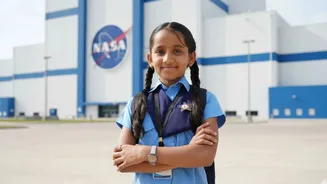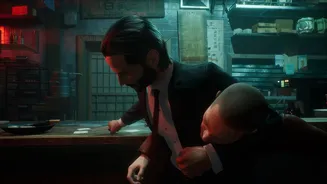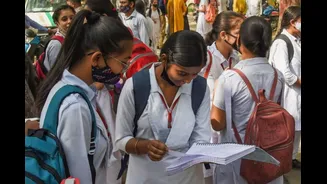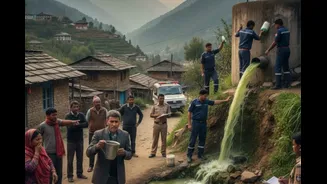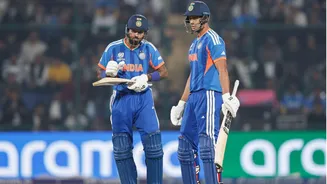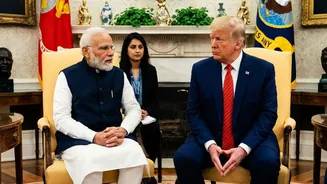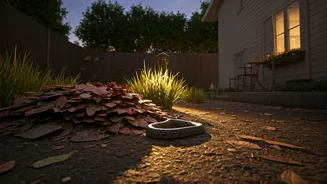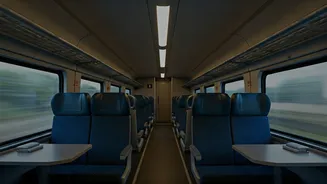None of us have even seen an aeroplane12-year-old Aditi Parthe is one of the 25 students shortlisted for Pune Zilla Parishad’s (ZP) planned visit to NASA.
Not even in her wildest dreams did Aditi think of boarding a plane, let alone visiting the US. She and her family are overwhelmed with the news, as the reality seems impossible. Enrolled at Nigudaghar Zilla Parishad school in Pune’s Bhor taluka, every morning, Aditi Parthe goes through a 3.5 km (an hour-long) walk to reach her school. After finishing her day there, she travels back along the same route around 5 to be at her maternal aunt’s hut. Her family toils through the night to make ends meet. Aditi's father and maternal uncle work as daily wage porters at Market Yard in Pune, while her mother lives with her elder brother in the father’s village. According to her, not even a single person possesses a smartphone in her house, nor does she have access to functional computers in the school. So naturally, when she heard and ultimately broke the news to her family, they couldn't believe what they were listening to in that moment. 25 Selected for NASA; 50 for ISRO Tour: Gajanan Patil Gajanan Patil, chief executive officer of Pune Zilla Parishad, told PTI that they aim to provide wide exposure to the students through the tour. “Out of 15,000 students, around 235 were shortlisted through written and oral interviews, and finally 75 were selected. Of them, 25 will visit NASA, while the remaining 50 will tour ISRO (Indian Space Research Organisation) facilities in India,” Patil said. Another 160 students will be exposed to other institutions like planetariums, IUCAA, GMRT (Giant Metrewave Radio Telescope), and Rashtrapati Bhavan and Parliament within India, he said. While sitting in the headmaster’s cabin at her school, Parthe shared, “When sir (headmaster) told my aunt, she was so happy she did not know what to say. My mother was the happiest. I called her at 7 in the morning to tell her that I will be going to America. Usually, I am the one calling her, but she called me 15 times that day.” Headmaster Steps In as School Lacks Computers A total of 13,671 students took the first MCQ exam round, and the top 10 percent from each block were shortlisted for the 2nd round, where they had to finish an online MCQ test. Unfortunately, the school didn't have any computer, and that's when the Headmaster, Ashok Bandal, stepped in and used his own laptop to teach the selected candidates (of the second round) the fundamentals of operating a computer. Later on, as many as 235 students were finalised for the last round involving PI (personal interview) at IUCAA. There, students were questioned on biology, mathematics, physics, chemistry, and geography. R Srianand, director of IUCAA, said they helped identify the students through a stringent assessment process involving two written tests and one personal interview. “The questions were based on science, space, and astronomy from their syllabus. Based on the evaluation, the top 25 will visit NASA, while the remaining 50 will go to ISRO facilities,” he said. “After the news of her selection was reported by local media, she has been given a cycle and bags. We have requested a laptop as well,” Varsha Kuthwad, Parthe’s school teacher, told The Indian Express. “Aditi is good at sports, elocution, and even dance. There is something different about her,” she boasts. “None of us have even seen an aeroplane,” Says Parthe’s Proud Aunt Parthe’s aunt, Mangal Kank, wishes nothing but the best for her. “None of us have even seen an aeroplane, let alone thought of travelling in it. It is a matter of huge pride for us. In our village, there is no alternative to becoming a porter if you don’t get educated. So we hope our children learn and get a respectable post, be it a government job or that of a scientist,” she told IE. Bandal said that the majority of the village's population has shifted to Mumbai or Pune in search of daily wage work. He further shed light on the risks of managing a rural school of 62 students with four teachers in a hilly area. “The situation of our school is such that we have students from many small villages, such as Golewadi, Karanje, and Devgarh. If there is a lot of rain, there is a bridge near Golewadi where water falls on it from the hill. It becomes risky to come to school, and naturally we have lower attendance then.” Kank's house survived the monsoon mayhem this year. It wreaked havoc as water seeped through the walls and floor of their kitchen. She informed that Parthe is barely exposed to the digital world, as the only time she uses a smartphone is when she visits her mother. She, according to her, is not familiar with NASA or what to expect in the United States. Though she understands English, it's hard for her to speak it fluently. Visa Process Ongoing Speaking to IE, Gajanan Patil, CEO of Pune Zilla Parishad, said, “It has been perceived that students from Zilla Parishad Schools do not get much exposure. So, we thought of sending these meritorious students to NASA and ISRO so that their scientific temperament is developed and they get interested in astronomy or any branch of science. This is part of our Pune Model School concept.” The ZP facilitated tatkal passport procurement for all 25 students going to NASA and has now applied for an expedited group tourist visa at the US Consulate General (CG) Mumbai. “I spoke with the CG, and I think we will get a group appointment immediately. The students will probably leave for the US in November,” Patil added, while confirming that Deputy Chief Minister and Pune Guardian Minister Ajit Pawar wrote to the consulate for a quick visa process. Along with the selected students, three ZP school teachers, two staff from IUCAA, and a medical officer will go on the NASA tour. The total budget is around Rs 2.2 crore. IUCAA to Track Students' Academic Progress IUCAA will continue to track the academic progress of the students beyond the visits, he said. “Our role is not just to facilitate the trips. We want to ensure their talent is nurtured. Based on this year's experience, we plan to prepare a booklet of questions for next year, and the evaluation process will be even more professional,” Srianand added. Samir Dhurdhe, in charge of SciPOP at IUCAA, further informed that they're making arrangements to ensure that Marathi-speaking Indian-origin scientists at NASA can meet the students and converse with them in their mother tongue. Recommended | Cracking GATE, Breaking Barriers: Ashritha’s Journey to IISc and NVIDIA
